Budget burdens survivors with the cost of domestic violence for another year
Share

The 2023-24 NSW budget leaves victims of domestic and family violence carrying the costs for another year; with insufficient funding provided to frontline support services.
Domestic violence has already cost the lives of 35 Australian women this year. The total economic burden of this crisis in NSW is estimated to have reached $5.1 billion per year[1]. While today’s budget focuses on cost-of-living relief, it fails to provide targeted relief to the people most in need.
“Our members are on the frontlines – and day after day we hear of the horrific realities women and children are facing. The cost-of-living crisis is impacting us all, but for victim-survivors, it’s costing lives and liberty and this is too high a price to pay,” said CEO of Domestic Violence NSW Delia Donovan.
“Many women and children are trapped in abusive homes – they can’t afford rent on their own, not even with rental subsidies or Centrelink income support. With insufficient investment in crisis accommodation and social housing, women are forced to return to the perpetrator or face homelessness. This is particularly true of older women who are the fastest growing cohort of Australians experiencing homelessness,” added Donovan.
Aboriginal and Torres Strait Islander women experience domestic and family violence at higher rates, with research showing First Nations women are 27 times more likely to be hospitalised from assault than non-indigenous women in Australia. [2] This increases to 51 times more likely in more remote areas. Migrant women experiencing violence also face additional barriers to accessing support, and those on temporary visas are ineligible for income support and health care.
“In simple terms – the cost-of-living crisis has meant a choice between abuse and, in the worst cases, murder, or the risk of homelessness,” said Donovan.
Domestic Violence NSW are, however, pleased to see the $4.4 million over three years to establish a new specialist multicultural domestic and family violence centre in southwest Sydney and $4.2 million increase for the NSW Sexual Violence Helpline. We also welcome the previously announced $6.6 million for specialist children and young people workers in 20 refuges, $6.1 million for victim-survivors to receive support at court hearings and $1.4 million for co-location of specialist workers in police stations. However, there is only $39.1 million in new funding overall for domestic, family and sexual violence initiatives in the 2023-2024 budget, alongside a $34.3 million increase for 20 women’s health centres.
This budget falls far short of what is needed. Comparatively, the NSW government invested only $262.7 million in 2022-2023, less than half of the $613 million that the Victorian Government invested[3].
“We didn’t even ask for half of what is required to close the funding gaps between NSW and Victoria in terms of domestic violence spending per capita. We only asked for a $176.35 million increase – which is a small price to pay for a woman and child’s right to safety,” added Donovan reflecting on Domestic Violence NSW’s budget submission, available here.
Domestic Violence NSW notes the NSW budget is forecast to return to surplus in 2024-2025.
“If this Government wants to achieve the goal of ending violence in a generation as per the National Plan, We need the NSW Government to fund all asks in the Domestic Violence NSW budget submission.”
“We also need investment in the NSW Primary Prevention Plan due to be released later in 2023, the NSW Workforce Development Plan currently in development and more support for the implementation of the laws to criminalise coercive control.”
“We cannot wait another year before making a significant increase in responding to and preventing domestic and family. We cannot expect victim-survivors to continue to carry the cost,” said Donovan.
Menchie Khairuddin is a writer Deputy Content Manager at Akolade and content producer for Third Sector News. She is passionate about social affairs specifically in mixed, multicultural heritage and not-for-profit organisations.

























